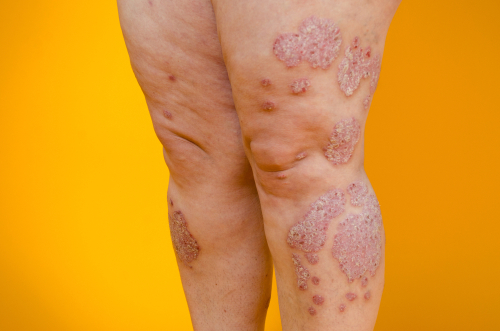Patients with cancer who receive immune checkpoint inhibitors (ICIs) have more than twice the risk of developing new-onset psoriasis than their counterparts who receive other cancer therapies, new research in JAMA Dermatology shows.
For the study, researchers tapped into data from the Taiwan National Health Insurance database and the Taiwan Cancer Registry. Study participants included patients who received antineoplastic medications for cancer at stages III and IV between Jan. 1, 2019, and June 30, 2021.
Exactly how ICIs increase risk for psoriasis is unclear, but researchers have some theories. “ICIs block inhibitory pathways, such as PD-1/PD-L1 and CTLA-4, which cancer cells use to evade the immune system, thereby leading to the reactivation of T cells,” they write. “This may enhance immune activity and can quickly lead to inflammation and autoimmunity, manifesting as psoriasis of immune checkpoint inhibitors.”
Patients were classified as immune checkpoint inhibitor (ICI) users (n = 3,188), and those who received chemotherapy or targeted therapies were classified as non-ICI users. The primary outcome was the incidence of psoriasis during the follow-up period, and the mean follow-up duration was 1.46 years.
“This is the most comprehensive evaluation with respect to identifying ICI use as instigators and risk factors for the development of new-onset psoriasis,” says Adam Friedman, MD, Professor and Chair of Dermatology at the George Washington School of Medicine in Washington, DC. He reviewed the new findings for the Dermatology Digest. He has seen a fair share of new-onset psoriasis cases as well as exacerbation of existing psoriasis in cancer patients taking ICIs.
“Knowing that there is an increased risk, and a substantial risk at that, is important [as is] knowing what to do about it,” he says.
Be mindful when managing ICI-induced psoriasis. This starts with considering how the psoriasis therapies will affect the cancer, Dr. Friedman notes.
Acitretin is the go-to therapy for these patients according to consensus statements. “An emerging therapy is the use of phosphodiesterase-4 (PDE4) inhibitors like apremilast, which appears not to influence the course or progression of cancer,” he says. With biologics, interleukin (lL)-23 or IL12/23 blockers seem to be safer than IL-17 inhibitors based on anecdotal data, he says.


